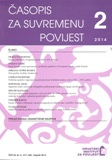Mađari i mađarska politika u političkom djelovanju Andrije Torkvata Brlića
HUNGARIANS AND HUNGARIAN POLICY IN THE POLITICAL WORK OF ANDRIJA TORKVAT BRLIĆ
Author(s): Vlasta ŠvogerSubject(s): History
Published by: Hrvatski institut za povijest
Keywords: Andrija Torkvat Brlić; relation towards Hungarians; propaganda war; reconciliation of Croats and Hungarians; real union with Hungary; 1848-1849; 1860s
Summary/Abstract: The paper shows the relation of the Croatian politician, linguist and journalist Andrija Torkvat Brlić towards Hungarians and Hungarian policy from the forties to the late sixties of the 19th century. The change in his political views towards Hungarians was primarily influenced by the current political developments in the Habsburg Monarchy and also in other European countries, as well as different political circles he was in contact with. During the year 1848, he was sharing, together with the majority of Croatian public, a persistent advocacy for the renovation of the Habsburg Monarchy in the spirit of Austro-Slavic concept and the refusal of reconciliation with Hungarians should they renounce the essential elements of their newly acquired national independence. In the summer and early fall of 1848, he actively participated in the organization of the Slovak uprising against the revolutionary Hungarian government and in the propaganda war of the Croatian and Hungarian press. From December 1848 to mid-March 1849, as an envoy of Ban Josip Jelačić in Paris, he worked on the suppression of the Hungarian anti-Croat propaganda. Under the influence of the major turn in policy of the Austrian government which openly began to implement its centralistic politics and did not take into account the interests of the Slavic people who gave it support in the conflict with the Hungarian revolutionary movement, the Austrian-Russian rapprochement and the preparation of the joint intervention against the revolutionary Hungarian army, as well as the intensive contacts with Polish emigration, he had reached an agreement with the leadership of Polish emigrant circles. The leadership of Polish emigration in Paris, which tended to restore the independent Polish state, had adopted some elements of the Austro-Slavic federalist concept thus succeeding in winning young Brlić over the idea of Croatian-Hungarian reconciliation. After returning to Croatia in the spring of 1849, he unsuccessfully sought to persuade Jelačić and other Croatian politicians to accept that concept. Upon the restoration of constitutionality in the Monarchy at the beginning of 1860s, he advocated closer relations with Hungary in a form of federal entity of equal partners providing that Hungary would recognize Croatian autonomy and territorial integrity. Since the Croatian and Hungarian Parliament failed to reach an agreement in 1861, during the mid-sixties of the 19th century Brlić was more closer to the moderate wing of the Unionist Party and he was also committed to achieving a real union between the two countries under the condition that Hungary recognize the territorial integrity and autonomy of Croatia under the Article XLII. In his relation towards the Hungarian policy, which he had defined according to variable political constellations of the Habsburg Monarchy, he consistently defended Croatian national interests.
Journal: Časopis za suvremenu povijest
- Issue Year: 46/2014
- Issue No: 2
- Page Range: 363-382
- Page Count: 20
- Language: Croatian

